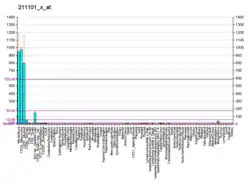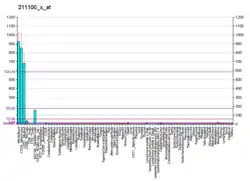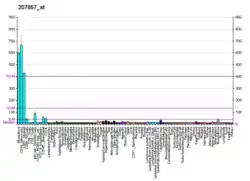LILRA2
Leukocyte immunoglobulin-like receptor subfamily A member 2 (LILRA2, CD85H, ILT1) is a protein that in humans is encoded by the LILRA2 gene.[3][4][5]
Leukocyte Ig-like receptors (LIRs) are a family of immunoreceptors expressed predominantly on monocytes and B cells and at lower levels on dendritic cells and natural killer (NK) cells. All LIRs in subfamily B have an inhibitory function (see, e.g., LILRB1, MIM 604811). LIRs in subfamily A, with short cytoplasmic domains lacking an immunoreceptor tyrosine-based inhibitory motif (ITIM) and with transmembrane regions containing a charged arginine residue, may initiate stimulatory cascades. One member of subfamily A (LILRA3; MIM 604818) lacks a transmembrane region and is presumed to be a soluble receptor.[supplied by OMIM][5]
Function
LILRA2 senses microbially cleaved immunoglobulin to activate human myeloid cells.[6]
See also
References
- ENSG00000274000, ENSG00000275290, ENSG00000278634 GRCh38: Ensembl release 89: ENSG00000239998, ENSG00000274000, ENSG00000275290, ENSG00000278634 - Ensembl, May 2017
- "Human PubMed Reference:". National Center for Biotechnology Information, U.S. National Library of Medicine.
- Samaridis J, Colonna M (Apr 1997). "Cloning of novel immunoglobulin superfamily receptors expressed on human myeloid and lymphoid cells: structural evidence for new stimulatory and inhibitory pathways". Eur J Immunol. 27 (3): 660–5. doi:10.1002/eji.1830270313. PMID 9079806. S2CID 2212182.
- Borges L, Hsu ML, Fanger N, Kubin M, Cosman D (Apr 1998). "A family of human lymphoid and myeloid Ig-like receptors, some of which bind to MHC class I molecules". J Immunol. 159 (11): 5192–6. PMID 9548455.
- "Entrez Gene: LILRA2 leukocyte immunoglobulin-like receptor, subfamily A (with TM domain), member 2".
- Hirayasu K, Saito F, Suenaga T, Shida K, Arase N, Oikawa K, Yamaoka T, Murota H, Chibana H, Nagai H, Nakamura Y, Katayama I, Colonna M, Arase H (Apr 2016). "LILRA2 is an innate immune sensor for microbially cleaved immunoglobulins". Nature Microbiology. 1 (6): 16054. doi:10.1038/NMICROBIOL.2016.54. PMID 27572839. S2CID 25500253.
Further reading
- Maruyama K, Sugano S (1994). "Oligo-capping: a simple method to replace the cap structure of eukaryotic mRNAs with oligoribonucleotides". Gene. 138 (1–2): 171–4. doi:10.1016/0378-1119(94)90802-8. PMID 8125298.
- Rojo S, Burshtyn DN, Long EO, Wagtmann N (1997). "Type I transmembrane receptor with inhibitory function in mouse mast cells and NK cells". J. Immunol. 158 (1): 9–12. PMID 8977169.
- Suzuki Y, Yoshitomo-Nakagawa K, Maruyama K, et al. (1997). "Construction and characterization of a full length-enriched and a 5'-end-enriched cDNA library". Gene. 200 (1–2): 149–56. doi:10.1016/S0378-1119(97)00411-3. PMID 9373149.
- Strausberg RL, Feingold EA, Grouse LH, et al. (2003). "Generation and initial analysis of more than 15,000 full-length human and mouse cDNA sequences". Proc. Natl. Acad. Sci. U.S.A. 99 (26): 16899–903. doi:10.1073/pnas.242603899. PMC 139241. PMID 12477932.
- Tedla N, Bandeira-Melo C, Tassinari P, et al. (2003). "Activation of human eosinophils through leukocyte immunoglobulin-like receptor 7". Proc. Natl. Acad. Sci. U.S.A. 100 (3): 1174–9. Bibcode:2003PNAS..100.1174T. doi:10.1073/pnas.0337567100. PMC 298746. PMID 12529506.
- Nakajima H, Asai A, Okada A, et al. (2004). "Transcriptional regulation of ILT family receptors". J. Immunol. 171 (12): 6611–20. doi:10.4049/jimmunol.171.12.6611. PMID 14662864.
- Sloane DE, Tedla N, Awoniyi M, et al. (2004). "Leukocyte immunoglobulin-like receptors: novel innate receptors for human basophil activation and inhibition". Blood. 104 (9): 2832–9. doi:10.1182/blood-2004-01-0268. PMID 15242876.
- Gerhard DS, Wagner L, Feingold EA, et al. (2004). "The status, quality, and expansion of the NIH full-length cDNA project: the Mammalian Gene Collection (MGC)". Genome Res. 14 (10B): 2121–7. doi:10.1101/gr.2596504. PMC 528928. PMID 15489334.
External links
- LILRA2+protein,+human at the US National Library of Medicine Medical Subject Headings (MeSH)
- PDBe-KB provides an overview of all the structure information available in the PDB for Human Leukocyte immunoglobulin-like receptor subfamily A member 2 (LILRA2)
This article incorporates text from the United States National Library of Medicine, which is in the public domain.




